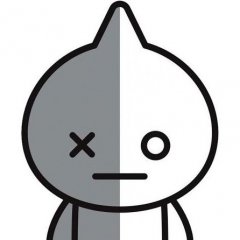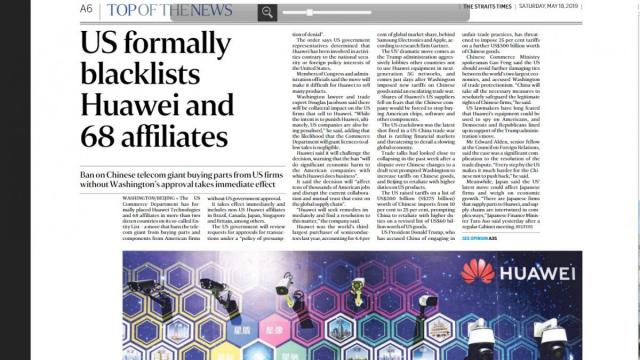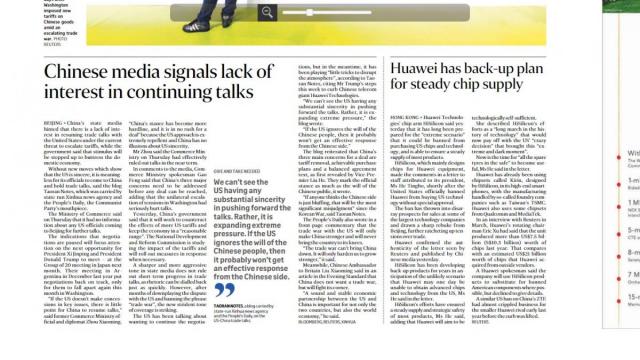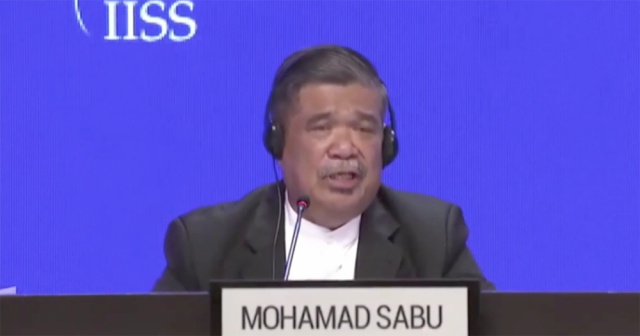Search the Community
Showing results for tags 'Politics'.
-
Putin gave a UK reporter a lesson about Russian history and views today after the breakup of USSR. The usually calm nature is totally gone in this press conference - He is clearly drawing a deep red line over Ukraine crisis with NATO/US.
-
Xi Jinping signals intent to remain in power by revealing politburo with no successor https://www.theguardian.com/world/2017/oct/25/xi-jinping-signals-intent-power-successor-politburo-china China’s president unveils his all-male cabinet, but crucially no member is young enough to take the reins from Xi at the end of his second term Xi Jinping has kicked off his second term as leader of the world’s second largest economy, vowing to spearhead the “great rejuvenation of the Chinese nation” and signalling his intent to tower over Chinese politics for decades to come. At just before noon on Wednesday, Xi unveiled the new line-up of China’s top ruling council – the Communist party’s politburo standing committee – leading six besuited comrades out into a blaze of camera flashes in the Great Hall of the People. “Here, on behalf of the newly elected central leadership, I wish to express our heartfelt thanks to all other members of the party for the trust they have placed in us. We will work diligently to meet our duty, fulfil our mission and be worthy of their trust,” Xi said in a 21-minute address that marks the formal start of his second term. Crucially, the all-male group contained no potential successor, since none of its five new members – all aged between 60 and 67 – is young enough to take the reins from Xi after the end of his second term, in 2022, and to then rule for the customary decade. Such is the secrecy that cloaks Chinese politics that the identities of the standing committee’s incoming members were known only as Xi escorted them out onto a scarlet-carpeted stage. Joining Xi and premier Li Keqiang on the elite committee are: Li Zhanshu, 67, Han Zheng, 63, Zhao Leji, 60, Wang Yang, 62 and Wang Huning, 62. “I still can’t get over the fact how the world’s second largest economy, which is declaring this new role of global leadership, is nearly as opaque as the North Korean political system,” said Jude Blanchette, an expert in Chinese politics from New York’s Conference Board research group. “I just find that absolutely striking and in a way almost unacceptable for a system that wants to play such a fundamental role in guiding and shaping the 21st century.” China’s propaganda apparatus has touted this week’s political show as an example of openness and transparency. However, a number of major western news organisations whose coverage of Xi’s rule has irked Beijing were excluded from Wednesday’s event without explanation including the BBC, the Financial Times, the Economist, the New York Times and the Guardian. In his address, Xi outlined his vision for what he called China’s “new era”, an era in which an emboldened and purified Communist party would play an even more prominent role in returning the country to its former glories. “It is my conviction that the great rejuvenation of the Chinese nation will become a reality,” he said, urging his party to become “the backbone of our nation.” “We should never entertain the idea of taking a breather or halting our steps. Instead, we must continue to rid ourselves of any virus that erodes the party’s fabric, make great efforts to foster a healthy political environment of integrity and generate waves of positive energy throughout our party which can build into a mighty nationwide force driving China’s development and progress.” Xi also pledged “a resolute push” to eradicate poverty, to “open China still wider to the world” and hinted at the more assertive and muscular role Beijing is expected to seek on the world stage in the years ahead. “With confidence and pride the Chinese people will be steadfast in upholding our country’s sovereignty, security and development interests,” he said. The unveiling of China’s new ruling council came one day after the end of the 19th party congress, a week-long political summit at which Xi established himself as the country’s most dominant leader since its revolutionary founder Mao Zedong. On Tuesday, Xi’s eponymous political philosophy was enshrined in the party’s constitution alongside those of Mao and Deng Xiaoping, the architect of China’s economic opening to the world. Experts say that momentous and highly symbolic achievement puts Xi in a virtually unassailable position at the pinnacle of the 89 million member organisation. Having failed to anoint a successor, he is now likely to be calling the shots in Chinese politics well into the 2030s. With Xi now entering his second, although perhaps no longer final five-year term, thoughts are turning to what the next stage of the Xi era might hold. Supporters claim that having used a ferocious anti-corruption campaign to purge rivals and consolidate his grip over the party during his first five-year term, Xi will now turn his mind to comprehensive reforms of China’s economy. “I think the real reform just began,” said Wang Wen, a pro-establishment scholar from a thinktank linked to Renmin University. Wang argued that Xi would enter his second term with “much more authority” and a greater ability to implement his blueprint for China. Such optimism was echoed in China’s party-run media on Wednesday as cadres lined up to heap praise on their all-powerful leader. “We firmly believe that if people all over the country roll up their sleeves under the guidance of Xi’s Thought … we will move steadily into the future with the irresistible force of a high-speed train,” Chen Meifang, a Shanghai railway official, was quoted astelling the Beijing Daily. However, such hopefulness is widely disputed. Blanchette said he expected to see a “super-sized version” of Xi’s first-term policies in his second stint, as China’s leader pursued what he saw as his “program of Chinese greatness”. That would mean accelerating efforts to build a modern, battle-ready military that could begin to push the United States further and further out of what China saw as its Pacific backyard; an increasingly assertive foreign policy in regions such as the South and East China seas; and continued efforts to promote a hi-tech economic revolution by championing huge companies that were either controlled or heavily aligned with the state. It would also mean that the Communist party – and the Communist party only – would continue to lay down the law, in all aspects of Chinese society. In an editorial celebrating the start of Xi’s “new era” on Wednesday, the People’s Daily, the party’s mouthpiece, argued: “History has shown and will continue to show that without the leadership of the Chinese Communist party, the idea of national rejuvenation is a fantasy.” “We should hunker in for a long winter of tight political control,” Blanchette predicted. We should hunker in for a long winter of tight political control Jude Blanchette Elizabeth Economy, the director for Asia studies at the Council on Foreign Relations, said she saw this week’s congress “as affirmation of the direction in which Xi has already been moving the party as opposed to a point at which now we are going to see the real Xi Jinping and his real reforms emerge”. She added: “I think what we are going to see is an intensification along the same lines.” Economy balked at the suggestion that Xi – whose first term has witnessed an unusually fierce crackdown on party opponents and human rights – might suddenly emerge as a political reformer. “I don’t think a crypto-liberal would do what he has been doing over the past five years. I don’t think a crypto-liberal lets Liu Xiaobo die in jail, and the arrests and the intensification of the attacks on the [human rights] lawyers. That is not a crypto-liberal,” she said. Blanchette said Xi had shown a remarkable “mastery of the political system” in China during his first term in power: “The second question though is does that mean he has an omniscience or an omnipotence to deal with all the significant challenges that China is facing? “There is a huge list of challenges that Xi Jinping has to deal with,” he added, pointing to a gradually slowing economy, a looming debt crisis and the possibility of a nuclear conflagration on its doorstep. “He now has the power to do it. But how he deals with these challenges will be one of the most important indicators of whether or not he is able to stay on for the term that he feels he deserves.” Additional reporting by Wang Zhen. What 'Xi Jinping Thought' Stands For https://www.forbes.com/sites/salvatorebabones/2017/10/22/what-does-xi-jinping-thought-mean-and-how-does-it-compare-to-america-first/#2bfee5ab3262 Xi Jinping is universally regarded as China's most powerful leader since Deng Xiaoping, and perhaps since Mao Zedong. Both Deng and Mao left their marks in the charter of the Communist Party of China, and the rumor is that Xi will be their first successor to do the same. Mao's "mass line" and Deng's "seeking truth from facts" have become official tenets of Communist Party dogma. Xi's "socialism with Chinese characteristics for a new era" may soon join these august concepts as official truth. But just what does "Xi Jinping Thought" really consist of? To answer that question, it helps to compare Xi's governing principles to those of the four preceding "paramount leaders" of China's Communist Party. Xi versus Mao Xi Jinping is most often compared to Mao Zedong, China's revolutionary leader, red emperor and communist theologian. Mao's political maxims were collected in the Little Red Book once read by leftist college students and Latin American guerillas. Mao Zedong thought is not all that bad, if you happen to be planning a people's revolution to overthrow your government. Unlike Lenin and most European Marxists, Mao taught that revolutions had to come from below. And unlike most revolutionaries, he still fought to overthrow the government even when he was the government. The infamous Cultural Revolution that rocked Chinese society from 1966-1976 was the result. Xi is no revolutionary, and he is certainly no Mao. Xi'sChinese Dream is a "moderately prosperous society," not a communist utopia. Xi does talk a lot about "national rejuvenation," but that's really just a way to avoid using the Western word for what he really means: renaissance. Xi's Chinese renaissance is all about China's space program, high speed rail network and high technology parks. But a real Chinese renaissance requires the reversal of China's long-term brain drain to the United States and other English-speaking countries. The problem? Most Chinese scientists are unwilling to give up their tenured positions overseas to take a chance on a permanent return to China. Barring a reversal of epic proportions, in 2021 Xi will preside over the centenary of the Chinese Communist Party. That will be as good a time as any to finally lay Mao Zedong Thought to rest for good. If Xi has his way, they may just take the opportunity to bury Mao along with it. He's been waiting long enough. Xi versus Deng Soon after the death of Mao, his long-time frenemy Deng Xiaoping put paid to the Cultural Revolution and started China on the path to opening and reform that it has followed for the last 40 years. Famous for saying that it was OK for some people to get rich before others, Deng was repeatedly condemned by Mao as a "capitalist roader" -- which, as soon as Mao died, is exactly what he turned out to be. To facilitate his economic reform agenda, Deng urged that China should "keep a low profile" in international affairs, biding its time while building its strength. Xi'sstrive for achievement strategy couldn't be more different. In his landmark Communist Party Congress speech, Xi pledged that China would have a "world class" military by 2050, in line with his policy of relentless maritime expansion in the South China Sea. Xi has departed radically from Deng's advice on foreign policy, but what Xi shares with Deng is a staunchly conservative preference for order over chaos. Deng ruthlessly suppressed the Tiananmen Square democracy movement in order to preserve the rule of the Communist Party. Xi has much more subtly turned the screws on political dissent using the more discriminating but perhaps more effective tools of online surveillanceand selective imprisonment. As the ever-quotable Deng said himself, "it doesn't matter whether the cat is black or white, as long as it catches mice." Xi versus Jiang Deng Xiaoing's successor Jiang Zemin is perhaps best remembered for the fact that everything done under his leadership was done "with Chinese characteristics." Deng may have coined the phrase "socialism with Chinese characteristics" to justify his introduction of the market into China's planned economy, but under Jiangthe phrase became a standing joke. Jiang Zemin codified these Chinese characteristics into the "Three Represents": the idea that in addition to the poor, the Communist Party of China would also represent China's business and cultural elites. Under Xi, this has evolved into the Two Represents, and if China's new rich get their way it may soon degenerate back into a novel kind of One Represent. Xi versus Hu Hu Jintao's major contribution to the intellectual life of the Communist Party was to bring Confucius back into the fold. Long prescribed under Mao as the reactionary idol of the pre-revolutionary patriarchy, today Confucius is back in China, with no small thanks to Hu, who rehabilitated Confucian thought, reopened Confucian temples, and chartered the Confucius Institutes to become China's cultural ambassadors to the world. Hu's trademark slogan was the "harmonious society" -- i.e., trust the government and don't complain and everyone can live in harmony. No word on what thenotoriously cranky sage, who got himself successively kicked out of ten different countries for criticizing their poor leadership, might have thought of this. Hu later extended the harmonious society to the harmonious world (i.e., trust China and don't complain and the world can live in harmony). With his One Belt, One Road expansionism and South China Sea island building, Xi seems keen to continue Hu's expansive foreign policy program, only with even less emphasis on the "harmonious" part of the equation. "Party First" Xi Jinping Thought, in a nutshell, seems to boil down to something resembling "America First, with Chinese Characteristics." By all accounts, Xi and U.S. President Donald Trump got along surprisingly well at their first meeting in April, perhaps because at a level deeper than mere speech they spoke the same language. If Xi's political philosophy isn't exactly China First, it is something close to it but at the same time distinctively Chinese: something like "Party First." And putting the interests of the Communist Party first is one thing he shares with all of his predecessors. Like Deng, Xi is a pragmatist who will stay on the capitalist road so long as it leads to much greater wealth than any other. Like Jiang, he is very happy to lead a ruling party dominated by his country's business elite. Like his immediate predecessor Hu, he is crafty enough to use patriotism and ethnic pride as tools to keep ordinary Chinese (if not necessarily China's minority groups) on his side. And like Mao, Xi seems to be ruthless enough to succeed in making his own Chinese Dream a reality. As long as he continues to put the Party first, Xi is likely to maintain his grip on power -- and the Party's loyalty. And as long as the Party puts Xi first, he is likely to have no cause to complain. Xi Jinping Thought may not sell as many books as Mao's did, but come 2021 it will be Xi who sets the course for the next 100 years of the Communist Party of China.
-
https://www.straitstimes.com/singapore/politics/founders-memorial-s-construction-set-to-cost-335-million why gov spend so much money on this? Is there public support for this, if not why is pap doing this if it hurts them???
-
A pretty good read. I hated pofma and how it was being exercised after being passed to law. This bill seems to be much worse. https://www.singaporelawwatch.sg/Headlines/anti-foreign-interference-bill-3-areas-of-concern-opinion
-
wow.. A public statement by Lee Wei Ling and Lee Hsien Yang: We have no confidence in PM Lee Hsien Loong and are worried about Singapore's future. https://www.facebook.com/weiling.lee.980?hc_ref=NEWSFEED https://drive.google.com/file/d/0ByodqaSLlpPIWHdRdFE2QlZYbzg/view
- 3,277 replies
-
- 7
-

-
- lee hsien loong
- lee kuan yew
- (and 5 more)
-
Another saga coming soon to a Parliament near you. The SLA statement was issued in response to a series of online articles published by opposition Reform Party's chief Kenneth Jeyaretnam since last Saturday, where he called on SLA to "shed some light" on the auction process for the properties and questioned if the ministers were "paying less than the fair market value". Citing the prime location of the area and his assumed size of the properties, he said: "It is difficult to see how (Dr Balakrishnan or Mr Shanmugam) could afford to pay the market rent for such a pricey property."
-
中共万岁万万岁!
-
Can anyone share stories of the most horrible colleagues you have met? My office is still ok but how do you handle tai chi masters, backstabbers, hot air balloons, prima donnas, blur sotongs and other difficult people at work?
-
- 21 replies
-
- 3
-

-
More exciting parliamentary debates in 2023! Starting with a light and entertaining lesson on how to dig your own grave 😂
-
https://www.channelnewsasia.com/singapore/amos-yee-us-court-grooming-child-porn-special-prosecutor-lawyer-2257577 Amos Yee the paedophile, could lose his asylum status and be deported back to Singapore. He is accused of exchanging nude photos with a 14-year-old girl via WhatsApp. The alleged incidents took place in 2019 between Feb 1 and Jun 30, and involved thousands of texts. When their relationship soured, the girl contacted a group of people “interested in exposing paedophiles”, the court previously heard. Hang out with that Alvin Tan really learned all the bad sh!t.
-
Will her plane be refueling at some rogue province? What's your bet?
-
Forum: Progressive wage or minimum wage? Detailed study needed source: https://www.straitstimes.com/forum/forum-progressive-wage-or-minimum-wage-detailed-study-needed Members of Parliament had a robust debate on the efficacy of a universal minimum wage policy to lift the wages of lower-wage workers, while minimising the cost to society (House sees spirited debate on issue of minimum wage, Sept 4). However, as Straits Times senior political correspondent Grace Ho pointed out, the debate generated "more heat than light" (A spirited debate on minimum wage, but where are the details?, Sept 4). It is time for an extensive study on the effectiveness of a universal minimum wage model in Singapore. This study should highlight the impact of universal minimum wage policies implemented around the world. It should also consider a report on what has been achieved since the introduction of the Progressive Wage Model (PWM) since 2012. These should be done via a parliamentary committee. Based on the study, the parliamentary committee should provide recommendations on whether the PWM or a universal minimum wage model would suit the unique context of Singapore. This study will hopefully strengthen the quality of arguments surrounding the PWM versus a universal minimum wage model in future debates.
- 56 replies
-
- progressive wage
- minimum wage
-
(and 1 more)
Tagged with:
-
Suddenly news feed and social media flooded with PAP speeches.
-
Reported in today ST About 30,000 public servants appointed as election officials, to undergo training SINGAPORE - The Elections Department (ELD) has appointed about 30,000 public officers as election officials and has called them up for training. For the 2015 General Election, public servants were called up for training about 11 months before the polls were held. Link : https://www.straitstimes.com/politics/about-30000-public-servants-appointed-as-election-officials-to-undergo-training
-
Lady who helped Amos Yee get asylum in US now wants him deported from US He was recently deplatformed after he was banned on Facebook and Twitter, and had his Patreon page disabled. This was after content he was uploading was reported. These included videos and Facebook posts that served to legitimise and legalise paedophilia. One former Yee supporter, Melissa Chen, is the latest, and probably the most relevant advocate to speak out against Yee. Basically, she’s a human rights activist originally from Singapore, who played a huge part in securing Yee’s political asylum in America. Change in perspective But for a while now, she has been strongly against Yee’s choice of content and speech. In perhaps the strongest statement yet, Chen made a nearly 10-minute video discussing her thoughts on Yee.(video at URL) Key points If you don’t have 10 minutes to spare, here are some of the key points she made. She had handed Yee some documents that kickstarted the entire asylum process while he was still in jail in Singapore. Yee had cut all ties with her since February 2017. He had apparently done this as he felt she was being too authoritarian in her advice to him to ensure his success in gaining asylum in the US. She rarely even thought about what he was up to, or kept up to date with him. Now, she feels Yee has to be deported from America, because of his views on paedophilia. She also volunteered to escort him on his one-way ticket back.While a free-speech advocate, she insists there are some ideas that are unacceptable: She did acknowledge the irony of a free-speech warrior like her advocating for shutting down Yee’s avenues for his free speech.Chen explained how she feels responsible, due to her role in getting him asylum. She reiterated her call to get Yee out of America, stating “being in America is a privilege, not a right”. Hindsight Chen then gave a succinct summary of the entire Amos Yee fiasco in Singapore, as well as highlight some of the international media’s glowing praise of Yee. After summarising the timeline, Chen talked about the blindspots and biases some activists, including herself, might have suffered from: One of those biases being his much lauded intelligence. She further stated that Yee was a narcissist and had “zero redeeming qualities”.Chen did reiterate her opposition to the measures taken against Yee in Singapore. She also blamed those actions, and Singapore’s general culture, on not nourishing his “neurodivergent idiosyncrasies”. Despite that, Chen also acknowledged Yee was no longer a child and had to be held accountable for his actions as an adult. Chen said she was personally sorry for how this turned out, and how this might affect future activists in Singapore. She also had this to say about Yee.
-
61% of those surveyed believe Malaysia heading in wrong direction source: https://www.tnp.sg/news/world/61-those-surveyed-believe-malaysia-heading-wrong-direction PETALING JAYA: Voter sentiment in Malaysia towards the Pakatan Harapan government has taken a slide following the handling of various contentious issues, a Merdeka Centre survey found. These include the Jawi lessons in vernacular schools, statements on civil servants' pension scheme and critical allowances. The poll found that 61 per cent of those surveyed believed that the country is headed in the wrong direction while only 26 per cent felt it was moving on the right track. Economic matters were the biggest concern for Malaysians, followed by leadership, administration, politics and racial issues. PREFERENCE The survey also showed that Chinese and Indian voters prefer Parti Keadilan Rakyat's president Anwar Ibrahim over Prime Minister Mahathir Mohamad. A preference poll between Dr Mahathir and Mr Anwar found that only 14 per cent of Indian voters and 20 per cent of Chinese voters as of November last year preferred the premier. However, Dr Mahathir's support among the Malays showed an increase - 42 per cent in October 2018 to 58 per cent in November last year. The survey noted that in July last year, the support for Dr Mahathir among the Indians dropped to 69 per cent, however, there was a 4 per cent increase in support for the premier from Chinese voters during the same period. The support for Dr Mahathir among the Chinese voters then dropped to 22 per cent in October and subsequently to 20 per cent in November. On the other hand, Mr Anwar seems to be favoured more among the Indian and Chinese voters while his support among the Malay voters has dwindled. The survey showed Mr Anwar's support from Indian voters went from 23 per cent in July last year to 62 per cent in November. During the same period, Mr Anwar also saw support from the Chinese community rise from 18 to 58 per cent. However, his popularity among Malay supporters dropped drastically throughout last year, from 31 per cent in October 2018 to 13 per cent in November. - THE STAR
-
HÀ NỘI — Việt Nam regretted that some contents of the remarks made by Singapore’s Prime Minister Lee Hsien Loong at the 18th Shangri-La Dialogue and on his Facebook page did not objectively reflect the historical truth, Spokesperson for the Ministry of Foreign Affairs Lê Thị Thu Hằng has said. She made the statement in response to reporters’ queries on Tuesday about the Singaporean Prime Minister's speech at the dialogue and the information posted on his personal website on May 31 saying Việt Nam had “invaded” and “occupied” Cambodia. Việt Nam’s Ministry of Foreign Affairs had discussed the issue with its Singaporean counterpart, she said. The contribution and sacrifice of Việt Nam in the joint efforts with Cambodian people to end the genocidal Khmer Rouge regime had been widely recognised, Hằng said. On November 16, 2018, the Extraordinary Chambers in the Courts of Cambodia (ECCC) issued a verdict on the crimes against humanity committed by the Khmer Rouge. The ruling reflected the objective historical truth, enforcing justice and ensuring fair restitution for victims, and was welcomed by the international community and the United Nations, she said. The recent accomplishments of ASEAN are the result of joint efforts by all member nations throughout the history of the association, the spokesperson said, adding that each member was deeply aware of the importance of strengthening intra-bloc solidarity based on mutual respect and common principles. As an active and responsible member of ASEAN, Việt Nam will continue working with other members to build a strong community with a central role in the region, the spokesperson said. —VNS https://vietnamnews.vn/politics-laws/520904/viet-nam-issues-statement-on-singapore-pms-speech-at-shangri-la-dialogue.html#MlxxxV4fd3fewqos.97
-
https://www.kinitv.com/video/24ebcc40-287b-4c1c-92b8-269a02892b2e Was watching an extract of a speech from the Shangri-La Dialogue By Malaysia's Defence Minister Mohamad Sabu. He has been widely criticised by many for his poor command of English on geopolitical issues. I listened to the entire dialogue as it is and though broken at times it was easily understood and the gist of the message was not lost. He used simple English instead of bombastic words. English may not be a country first language. Are politicians expected to speak a certain level of English? I would certainly be more concerned about getting the main facts right than working hard to be a grammar nazi. English is lingua franca, widely spoken in many countries. When we go overseas to countries whose native language isn't English we speak to them in English expecting them to understand. Looking at the shift of major power in the world today should we be shocked if the lingua franca one day becomes Mandarin? Fair enough to assume the rise of China will be accompanied by the rise of Mandarin? Where will that leave the Americans? Who are widely known to perceive the world as "It's okay everybody speaks English anyway." Just interested to hear more opinions. Here's his message for those unable to view the video: So what did Mohamad speak about? Christchurch terror attack “accident” in New Zealand The video began with Mohamad touching on the Christchurch terror attack in March 2019. He condemned terrorism and praised the response of New Zealand Prime Minister Jacinda Ardern to the attack. Mohamad said: “So, we understand that terrorist is no border, and no ideology, and no religion. So we have to fight with them in soft way and hard way. But I am very appreciate the role of the Prime Minister of New Zealand, how she faced with the accident in New Zealand. We appreciate him, that’s the way the world leader should behave when that thing happen in their country. So I salute the Prime Minister of New Zealand.” Mohamad then addressed the sources of terror funding, calling them the “father” and “mother” of terrorists. Elaborating on how terrorists have access to advanced weaponry and funding, Mohamad said: “These terrorists, who’s the father and mother? Because they have a lot of money, they have very sophisticated weapons. If they’re an NGO, I think they cannot afford to have that modern weapon.” Mohamad then referenced the presence of terrorists groups in Idlib, Syria, adding: “And now in Idlib, they even have rocket launcher. So who’s the father and mother? We must our intelligence must share and expose who the mother and father, then we can reduce their activity throughout the world.” China’s regional activity: “The China coast guard is bigger than Malaysia warship” Subsequently, Mohamad talked about the behaviour of China in the region and stressed the need for diplomacy, given that “the China coast guard is bigger than Malaysia warship”. Mohamad highlighted: “We know China is a border with us, China is near to us. So, any they changing of the policy will affect us. That’s why we — I know… sometimes they send their coast guard. The China coast guard is bigger than Malaysia warship. So how can we begin to chase them? So we cannot fight with them. But we will always talk to them, defend diplomacy, respect sovereignty…” Mohamad then referenced the opening speech of Singapore Prime Minister Lee Hsien Loong, on May 31, who stated that a clash between America and China will see many nations affected. “… and if they (China) send a warship there, then America will also challenge them. So, when the elephant fight, the grass will suffer. When elephant laugh, the grass will suffer. That’s mentioned by Prime Minister Lee last night. So we must active defend diplomacy, that we must get together, many time, this not the first time, second time or third time, many time to dialogue, because we want to keep the peace neutrality zone in this area, especially in South China Sea.” Mohamad concluded his speech by criticising the behaviour of large countries for not sticking to their rhetoric of respecting the sovereignty of other countries, as laid down by international treaties: “Big powers, they come and they give speech, they say we respect sovereignty, we respect UNCLOS, we respect COC (Code of Conduct), but their behaviour is different. That is we, the small country, especially ASEAN, we must unite together to face this problem. Thank you very much.”
-
The Forces That Could Plunge Venezuela Into Chaos https://www.bloomberg.com/news/features/2019-01-31/the-forces-that-could-plunge-venezuela-into-chaos From Juan Guaidó and U.S. sanctions to a starving population and protest, the country is rushing toward a breaking point. Events are moving fast in Venezuela, and not in President Nicolás Maduro’s favor. Scattered protests in Caracas the night of his second inauguration, on Jan. 10, quickly grew into organized demonstrations as thousands heeded opposition leader Juan Guaidó’s call to march against the regime. At press time, Maduro remains in office, but he faces a litany of threats: the economy, which has been devastated by low oil prices; powerful international interests, including the U.S., which condemned his 2018 reelection as illegitimate; Guaidó, head of the National Assembly, who’s claimed the title of interim president until new elections can be called; and the military, whose loyalty Maduro needs above all else to hold on to power. The president made a show of courting the armed forces’ support and has sent security forces into areas of unrest. But every day Guaidó roams freely in Caracas, holding rallies and building a government in waiting, Maduro’s grip on power becomes more tenuous. The Military Guaidó supporters first fanned out to military bases and national guard stations around Caracas in the days after he declared himself president on Jan. 23. They carried copies of a law from the National Assembly granting amnesty to any member of the armed forces who defects to the anti-Maduro cause. So far the top brass has stood behind the commander-in-chief, who long ago secured their loyalty with lucrative prizes: the reins of Petróleos de Venezuela SA (PDVSA), the state-owned oil company; control of the ports; contracts for housing projects; and the rights to valuable mining and oil-services concessions. It would be a surprise if military leaders broke ranks and moved against the authoritarian regime, says historian Tomás Straka of Andres Bello Catholic University in Caracas: “Their economic interests and vision are completely fused with Maduro’s.” Despite the outreach from the Assembly, they’ll be in trouble if he falls. Several high-ranking officers have been sanctioned by the U.S., accused by American prosecutors of graft, drug running, and other crimes. Many in the rank and file also remain behind Maduro, at least publicly. More than a few were photographed burning the amnesty documents. Still, dissent has simmered since before Maduro’s tenure. A military coup deposed his predecessor and mentor, the late Hugo Chávez, for a few days in 2002. The mood among the soldiers has only soured since, as the economy has crumbled, with those down the chain of command struggling along with the rest of the population. They, too, have to deal with desperate shortages of food and medicine, blackouts, and water taps that run dry. There have been reports of desertions. Asked for their reactions to the amnesty offer over the weekend, some men in uniform patrolling the city, rifles slung over their shoulders, gave a wink or a thumbs-up. The World While key allies Russia and China continue to support Maduro, the pro-Guaidó faction swelled in just over a week to more than 20 countries, including Canada, Israel, and the U.K. In Latin America, 11 countries lined up to follow President Trump’s lead in pushing for regime change. Among their motivations: More than 3 million people have fled Venezuela, according to the United Nations High Commissioner for Refugees, mainly to neighboring lands. “This isn’t merely a question of applying democratic principles, this is a question of countries bearing the brunt of the negative consequences,” says Benjamin Gedan, a former South America director at the White House’s National Security Council. Not all in the region are on board. Mexico and Uruguay have called for de-escalation; Bolivia, Cuba, and Nicaragua have reiterated their support for Maduro. The European Union stopped short of giving Guaidó the nod, though it signaled it would do so if Venezuela didn’t schedule “free, transparent, and credible presidential elections” by the beginning of February. Meanwhile, the U.S. has been assisting Guaidó in a kind of smoke-and-mirrors game of brinkmanship, insinuating that it may be building up a military force in Colombia to invade if necessary. Addressing the UN Security Council, U.S. Secretary of State Mike Pompeo was blunt. “Now it is time for every other nation to pick a side,” he said. “Either you stand with the forces of freedom, or you’re in league with Maduro and his mayhem.” The Money The Trump administration dealt its hardest blow yet to Maduro when it put new sanctions on PDVSA. Once Latin America’s largest producer, Venezuela is pumping less than North Dakota does these days, but oil sales remain its main source of revenue. Sanctions will effectively block the national oil company from exporting crude to the U.S. and crimp the regime’s cash flow. Its U.S. subsidiary, Citgo, will be allowed to continue operating, but all revenue will be held in accounts the Maduro regime can’t access. Guaidó has vowed to appoint his own boards to PDVSA and Citgo—a mostly symbolic gesture for now, but one that nevertheless adds to his aura of authority. Pompeo took another step toward starving out Maduro on Jan. 29, granting Guaidó control over Venezuelan assets and property in U.S.-insured banks, including the Federal Reserve Bank of New York. (The State Department has declined to say how much money is in the accounts.) American officials also successfully lobbied the Bank of England to deny Maduro access to $1.2 billion in gold the Venezuelan government holds in London, stymieing its efforts to pull in funds from abroad. Maduro’s government owes Russia and China billions of dollars in loan payments, but that’s unlikely to faze the sitting president. Since the Trump administration began slapping sanctions on Caracas in 2017, the government has defaulted on more than $9 billion in debt owed to bondholders, yet both creditors have been staunch so far in their support. The real problem for Maduro is losing the ability to dole out money. The more of the economy Guaidó gains control over, the harder-pressed Maduro will be to keep key allies on his side. The military, for instance, is unlikely to stick around if he loses the power of the purse. The People Hungry, broke, and exhausted, Venezuelans are angrier than ever with Maduro. And after more than a year of silence in the wake of the mass demonstrations of 2017, Guaidó has reignited their passion for protest. Almost two years ago, millions turned out and encountered tear gas and violence at the hands of security forces. Thousands were arrested during months of demonstrations, and hundreds died. This time the protests have been mostly peaceful. Security officers were out when Guaidó supporters again took to the streets of Caracas on Jan. 30, but they largely kept ranks as protesters marched past. Earlier, Maduro launched a series of nighttime raids in the working-class neighborhoods and slums that were once rock-solid Chavista bastions but have begun to shift away from him. There, under the cover of darkness, members of the deadly Special Action Force used tear gas, guns, and even grenades against demonstrators. “Maduro won’t let go of power easily,” says Jesus Gonzalez, a motorcycle taxi driver in the vast Petare slum. “He doesn’t mind pumping anyone who protests against him full of lead.” Through all of this, Guaidó hasn’t been arrested. Although Maduro has prevented him from leaving the country, he’s so far been free to travel locally, meet with foreign leaders, and speak to the press. Social media blackouts have curtailed his reach at times, while Maduro has been touring the country’s military installations trailed by a TV crew filming generals as they swear their allegiance. At press time, Guaidó was still leading marchers and planning further protests for Feb. 2, when the EU’s deadline runs out. Venezuela is ‘disease threat to America’ as measles and diphtheria cases soar in crisis https://www.express.co.uk/news/world/1081227/venezuela-news-maduro-crisis-president-guaido-measles-diphtheria The South-American country has plunged into economic ruin and political chaos following almost 20 years of price control and stringent policies launched by socialist leader Hugo Chavez. The meltdown has profoundly affected Venezuela’s health system, whose current state has been compared by experts to the ones of war-stricken countries such as Syria and Yemen. Diseases such as measles and diphtheria, which could be contained with widespread vaccinations, have re-emerged in the country, putting its neighbouring countries at risk of contagion as millions flee to Brazil and Colombia for a better life. A paper in the journal Emerging Infectious Diseases said: “The ongoing diphtheria and measles epidemics in Venezuela, and spill over into neighbouring countries, evoke the re-emergence of vaccine-preventable diseases observed in Syria and Yemen and the consequent threat to regional, and potentially global, public health.” Measles, a highly infectious viral illness which can be fatal, and diphtheria were thought to be under control in Venezuela, but its chronic shortage of medicines and vaccines and the general poverty of the country fuelled their return. Moreover, medically trained workers are among the millions who have left the country, according to the paper written by academics led by Alberto Paniz-Mondolfi, a Venezuelan infectious diseases pathologist. He said: “The continued mass exodus of around two million persons from Venezuela since 2014, not only to Colombia, but also to Ecuador, and Brazil, represents an ongoing risk that vaccine-preventable diseases will be carried with them.” Venezuela now contributes to nearly seven out of 10 cases of measles in the Americas, just 11 years after the country believed to have stamped it out. Diphtheria, a potentially deadly disease affecting nose, throat and sometimes skin, was first spotted again after 24 years in 2016.
- 48 replies
-
- politics
- latin america
- (and 5 more)
-
https://www.nytimes.com/2018/09/23/world/asia/maldives-elections.html NEW DELHI — The Maldives, the isolated scattering of islands caught in a geopolitical struggle between China, India and the West, were thrust into more uncertainty Sunday when voters appeared to have ousted the country’s autocratic president. With votes still being tallied, local news organizations reported that Ibrahim Mohamed Solih, the opposition candidate, had beaten President Abdulla Yameen. Mr. Solih won 58 percent of the vote with about 97 percent of ballots counted, according to the independent news websitemihaaru.com. Transparency Maldives, an election watchdog, said he had won “by a decisive margin.” As Mr. Solih declared victory and his supporters danced in the street, observers held their breath as they waited to see what Mr. Yameen would do next. His campaign had yet to concede by early Monday morning, and a spokesman for the Maldives’ Election Commission said official results would not be announced for a week, according to Reuters. “This is a moment of happiness, this is a moment of hope, this is a moment of history,” Mr. Solih said at a news conference at midnight. He said, “I would like to call upon Yameen and ask him to respect the will of the people and to immediately begin the smooth transition of power as per the Constitution and the law.” With Mr. Yameen hoping to solidify his hold on power with a second term, the opposition had warned that the Maldives’ nascent democracy was at stake in the election. Accusations of fraud have plagued both sides. As polling stations opened on Sunday, lines of voters snaked down streets in the Maldives and in countries with large Maldivian communities, like Sri Lanka, suggesting a high turnout. Lying southwest of India, and stretching across maritime routes that are crucial to China, the Maldives has been caught up in recent years in Beijing’s growing global ambitions, which the United States and its allies have struggled to contain. China has spent hundreds of millions of dollars on infrastructure projects in the Maldives, which critics, including the political opposition, warn amount to “debt-trap diplomacy” that weighs down the recipient country with loans in order to secure a naval base as repayment. The governments of both countries reject that assessment. Even before the elections on Sunday, Mr. Yameen had been accused of rigging them, forcing employees of state-owned companies to vote for his party, stacking the election commission with loyalists, locking up opposition leaders and canceling voter registrations. On Saturday night, the police raided the opposition’s office in the capital, Malé, citing evidence of vote-buying. This month, the police said they had unraveled a plot to “create the false impression that the election will not be free and fair,” which Western diplomats warned could be used to annul the elections if the governing party does not win. The United States said this month that it would impose sanctions on Maldivian officials if the elections are not free and fair. But both the European Union and United States declined to send teams to monitor the voting, wary of appearing to condone them. The election pitted Mr. Yameen’s governing Progressive Party against a unified opposition led by Mr. Solih, a senior lawmaker from the Maldivian Democratic Party. The Maldives became a democracy in 2008, when it held its first vote to elect a president directly. Mr. Yameen came to power in 2013, after elections monitored by more than 100 international observers. Since then, he has jailed his political opponents, including his half brother, Maumoon Abdul Gayoom, who led the country for 30 years until opening it up in 2008, and Muhammed Nasheed, the first democratically elected president. The opposition rallied behind Mr. Solih after many opposition leaders, including Mr. Nasheed, fled into exile. Many observers had said the opposition would win if there were a level playing field. For the first time in three years, it was permitted this month to hold a rally, after the government came under pressure for not issuing permits in the past. Around 10,000 people attended, about twice as many as at the governing party’s rallies, though in the past the government has used force to stifle protests and dismissed dissenters as terrorists. “There is a huge popular groundswell in favor of change,” said Mr. Solih’s campaign manager, Mariya Ahmed Did. “President Yameen was not given a mandate to trample all over Maldivian democracy and our Constitution, but that is what he has done these past five years.” She said, “The Maldives risks becoming just another banana republic.” Mr. Yameen’s campaign manager, Adhlee Ismail, denied in a brief telephone interview that the elections had been rigged. The Chinese government has been a consistent supporter of Mr. Yameen despite his crackdown on dissent. In February, Beijing sent a naval force to linger off the coast of Malé after Mr. Yameen sent troops to burst into the Supreme Court and jailed two of its justices after they overturned the convictions of opposition politicians. Mr. Yameen then declared a state of emergency and prevented Parliament from meeting for a while. Even if Mr. Yameen were to lose, China’s influence would not simply be rolled back, some observers say. The United States and India are unwilling or unable to match the billions of dollars Beijing has invested in cash-starved regions of South Asia as part of its “One Belt, One Road” initiative. China is spending about $62 billion in Pakistan alone as part of the program, tilting another American ally further into its axis. “If President Yameen loses, China will be able to work with the next leader, as it has shown in the case of Sri Lanka after the 2015 election,” said Nilanthi Samaranayake, a South Asia analyst at the Center for Naval Analyses, a think tank based in Arlington, Va. For small nations in the region, China’s appeal as a source of money for development “transcends domestic politics,” she said. Many in the Maldives and elsewhere are wary of China’s increasing military interests. Despite assurances to the contrary, Beijing has steadily bolstered its presence on a collection of disputed reefs in the South China Sea, eventually building bases there. The Maldives, which is included in China’s One Belt, One Road plans, has received about $2 billion in Chinese loans that critics say will be difficult to repay. The Chinese initiative has been likened to the United States’ ambitious Marshall Plan in Europe after World War II, but the Marshall Plan was mostly composed of grants rather than onerous loans, critics argue, and went toward economically viable projects. Mr. Yameen has been racked by accusations of corruption, including reports that he plans to sell some of the 1,200 islands that make up the Republic of Maldives for his personal gain, a charge he has denied. Although the Maldivian government said international journalists were welcome to report on elections, many — including from The New York Times — were unable to secure visas to enter the country.
-

Political office holders rcv avg bonus of 4mths in last 5yrs
Theoldjaffa posted a topic in Lite & EZ
Will station myself outside ministries instead of commercial buildings to sell my tisu liao Excerpts below. Click on the link for full article as it's difficult to post from my 4" phone. https://www.straitstimes.com/politics/political-office-holders-received-average-performance-bonus-of-4-months-salary-in-last-five Lao Goh said again, Ministers are not paid enough -
LHL says no need for opposition since most of the population supports the PAP and they have put in Non-Constituency MP in today's ST report http://www.straitstimes.com/politics/not-wise-to-purposely-let-the-opposition-grow-bigger-says-pm Are these Non-Constituency MP what people want other than those participated in the election and how have they performed? Is a one party that has been debated over the years still what people want? Is the idea of not to "purposely" let the opposition grow bigger being the same as making sure they don't grow? How are we going to get another voice in the parliament? If you have most of the resolutions passed in parliament with almost 100% yes, we need to review why then some of these decisions failed. All that have voted yes are not thinking enough or simply complying. Mr Lee also stressed the importance of thinking boldly, and long-term yesterday. The thinking must start from the top not bottom up. Any thoughts?
- 46 replies
-
- 3
-

-
- opposition party
- politics
-
(and 5 more)
Tagged with:
-
Ok tiko guys... This is a serious political topic concerning the future of our freedom of speech, human rights and all that good stuffs.
- 2 replies
-
- cooling off day
- arrest
-
(and 4 more)
Tagged with:
-
Singapore PR ask why they cannot vote for government since they have vested interest in our little red dot. Read already angry a not? from: https://www.facebook.com/AllSingaporeStuff/photos/pb.487870694661330.-2207520000.1394120473./520591754722557/

.png)
















